Key takeaways:
- Coaching transformed from skepticism to appreciation, highlighting its role as a valuable partnership for personal growth and goal clarity.
- Setting clear income goals and breaking them into manageable milestones increased accountability and focus, enabling proactive financial planning.
- Reflecting on progress revealed emotional resilience and the importance of viewing challenges as opportunities for growth, rather than setbacks.
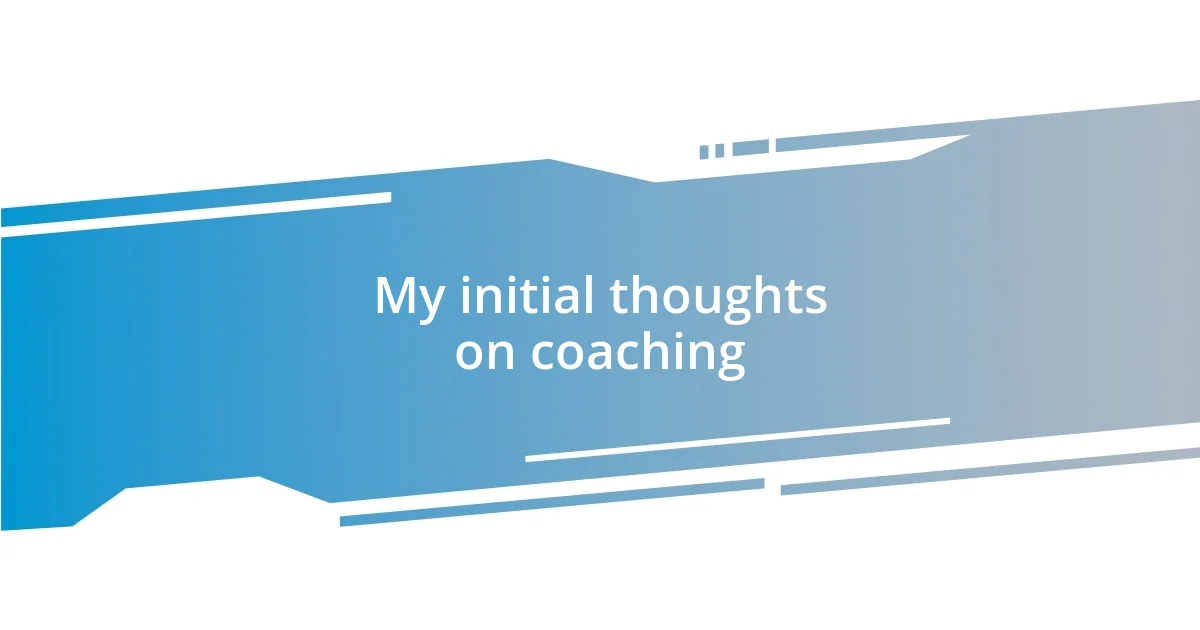
My initial thoughts on coaching
When I first heard about coaching, I was somewhat skeptical. I wondered how a person could guide me in ways I hadn’t explored myself. But then I thought about my own journey and realized that sometimes we need an outsider’s perspective to truly see our potential.
One of the early moments that struck me was when I attended my first coaching session. The coach asked me questions that dug deep into my motivations and aspirations. I remember feeling a mix of vulnerability and excitement. How often do we really take the time to reflect on our dreams? That experience opened my eyes to the power of focused inquiry in helping me clarify my goals.
As I reflected on my initial thoughts, I started to appreciate coaching as a valuable partnership rather than a directive process. It felt more like a collaboration where I could explore my strengths and weaknesses alongside someone who genuinely cared about my growth. I found it profoundly liberating to have someone celebrate my progress with me, making the journey feel less solitary.
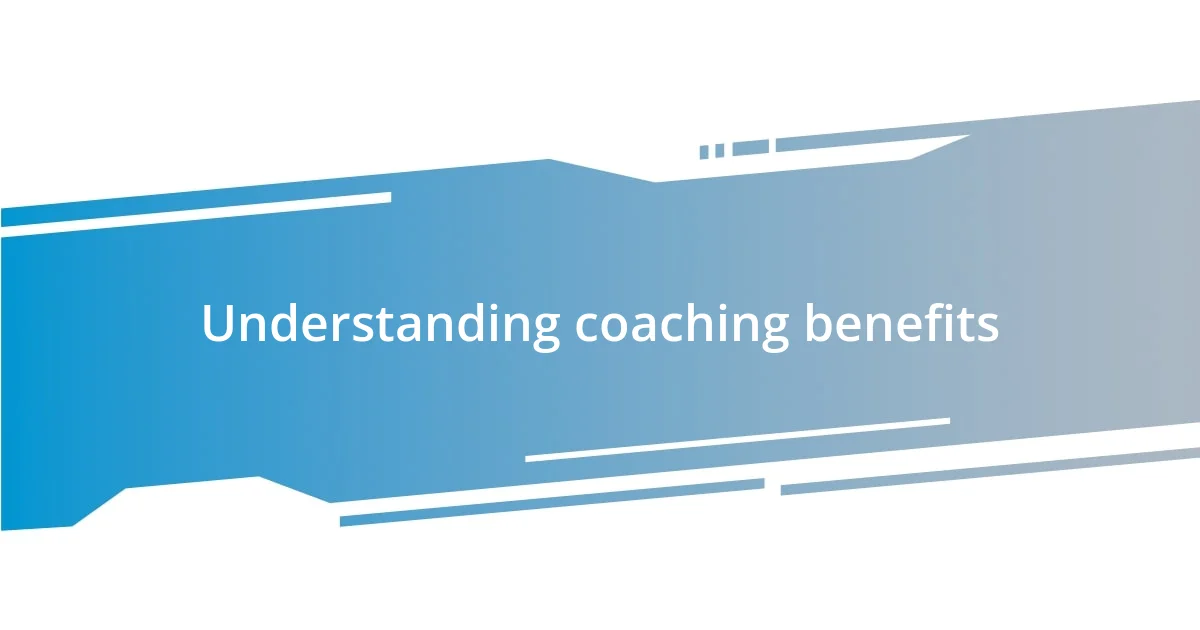
Understanding coaching benefits
As I dove deeper into the coaching experience, I began to realize the profound benefits it offers, especially in terms of personal and professional growth. Coaching isn’t just about receiving advice; it’s about unlocking potential and building self-awareness. One significant benefit for me was the way coaching helped me break down barriers that I didn’t even know existed. There was a moment when my coach guided me through a visualization exercise that revealed limiting beliefs I had about my capabilities. That realization was both daunting and exhilarating, pushing me to embrace new challenges.
Here are some key benefits of coaching that I discovered along my journey:
- Clarity of Goals: Coaches help you articulate and refine your goals, ensuring they align with your values and aspirations.
- Accountability: Regular check-ins make you accountable for your progress, fostering discipline and commitment.
- Personal Growth: Coaches can highlight blind spots, encouraging self-reflection and encouraging personal development.
- Skill Development: Whether it’s communication, negotiation, or leadership skills, coaching provides targeted practice to enhance your abilities.
- Emotional Intelligence: Engaging deeply with a coach can cultivate better emotional awareness, allowing for improved relationships and decision-making.
Reflecting on these benefits, I often find myself feeling grateful for the growth I’ve experienced. Coaching has not only propelled me forward in my career but has also enriched my understanding of myself and my aspirations.
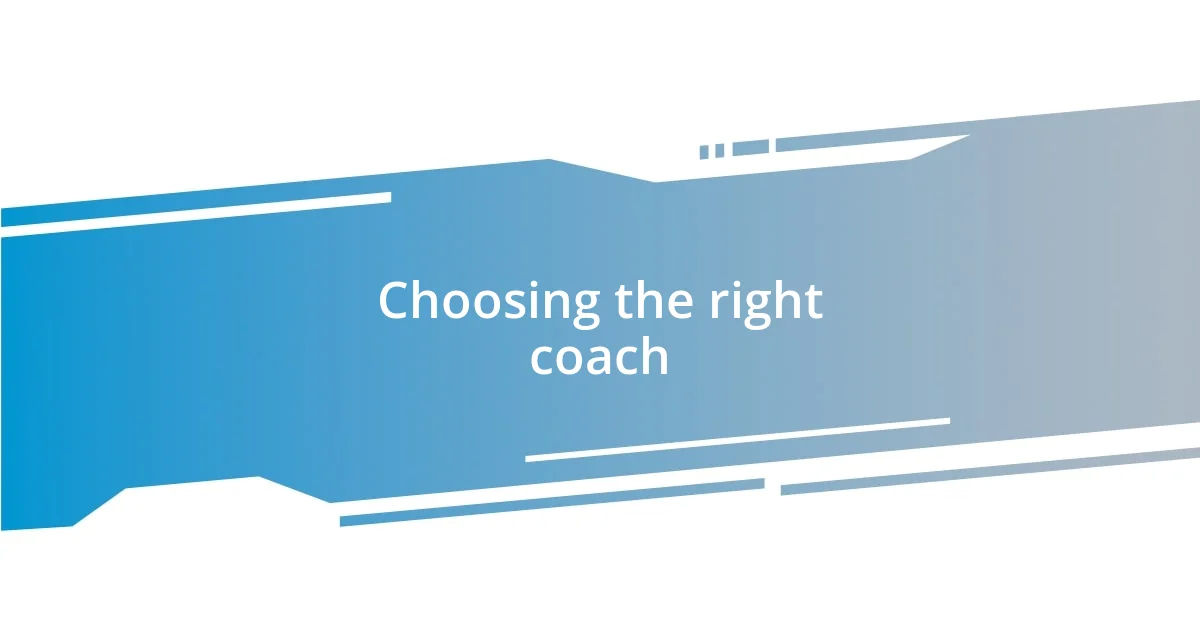
Choosing the right coach
Choosing the right coach is a pivotal decision that can shape your coaching journey significantly. In my experience, I found it essential to look beyond qualifications and consider a coach’s personality and style. I remember interviewing potential coaches and discovering that their approach to accountability and motivation resonated with me more profoundly than just their impressive credentials. Finding someone whose energy complements yours can make a considerable difference.
Evaluating a coach’s background and specialties is also crucial. For instance, when I was exploring financial literacy, I wanted someone who not only had experience in that realm but could also empathize with my struggles. I can still recall a conversation with a coach who shared her own journey from financial uncertainty to stability. Her stories made me feel that I wasn’t alone in my quest. This level of empathy can create a trusting and supportive coaching environment that fosters open dialogue.
Lastly, the chemistry between you and your coach cannot be overstated. I found that during our initial sessions, it became evident whether I would thrive under their guidance or not. It’s like meeting a new friend—sometimes you just hit it off, and other times it feels forced. Ultimately, I realized that a strong rapport can enhance the effectiveness of coaching, enabling you to delve deeper into your challenges and aspirations.
| Factors | Considerations |
|---|---|
| Personality Fit | Seek someone whose energy matches yours for better engagement. |
| Specialty and Experience | Find a coach who specializes in the areas you want to improve. |
| Chemistry | Trust your instincts about how you connect during initial meetings. |
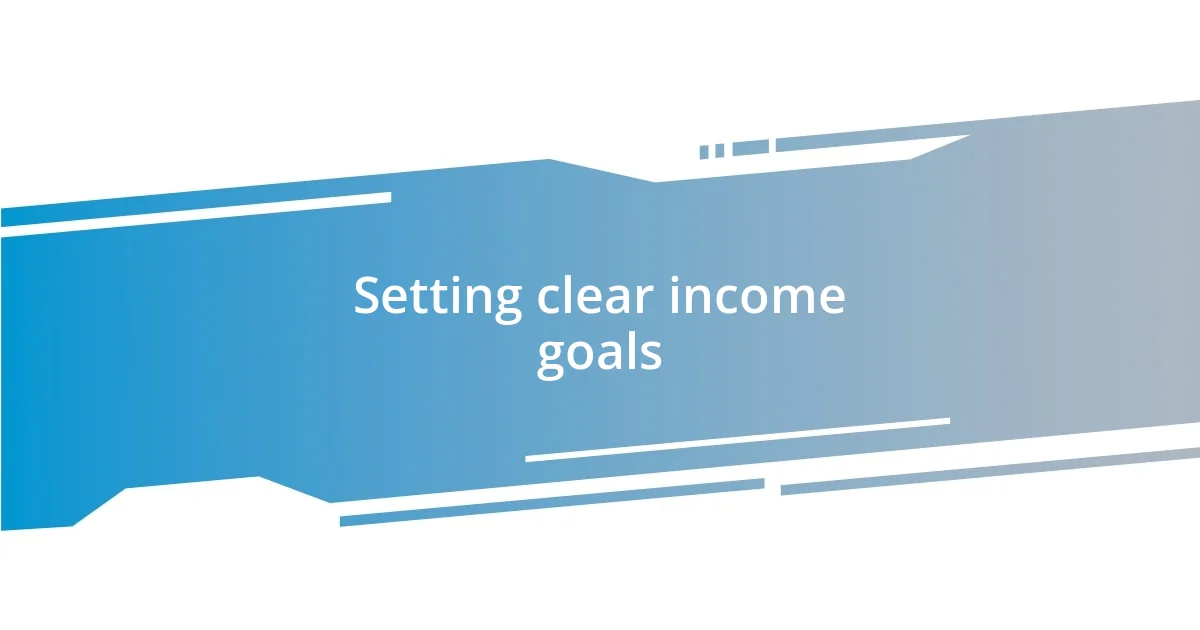
Setting clear income goals
Setting clear income goals can be a game-changer in the coaching journey. For me, articulating what I wanted to achieve financially required a thorough introspection that I hadn’t done before. When my coach asked me to envision my ideal income scenario, I felt a mix of excitement and anxiety—what if I set the bar too high or too low? This exercise not only defined my targets but also illuminated my underlying beliefs about money.
One powerful moment occurred when we broke my income goal down into smaller, manageable milestones. I remember the thrill of planning out my year in quarters, something I had never attempted. Each financial target was like a mini-challenge, and celebrating those little victories became some of my favorite moments. It’s amazing how setting specific income goals can shift your focus from overarching fear to actionable steps. How often do we let the fear of the unknown paralyze us? I found that by outlining my goals, I could conquer that fear with a solid plan.
As I progressed, I realized that accountability played a crucial role in reaching my goals. I intentionally scheduled regular check-ins with my coach to evaluate my progress. The sense of responsibility I felt pushed me to stay committed, and whenever I hit a bump in the road, those conversations became invaluable. Reflecting on these moments, I learned that clarity isn’t just about determining your goals; it’s also about establishing a supportive system that helps you navigate the journey toward achieving them.
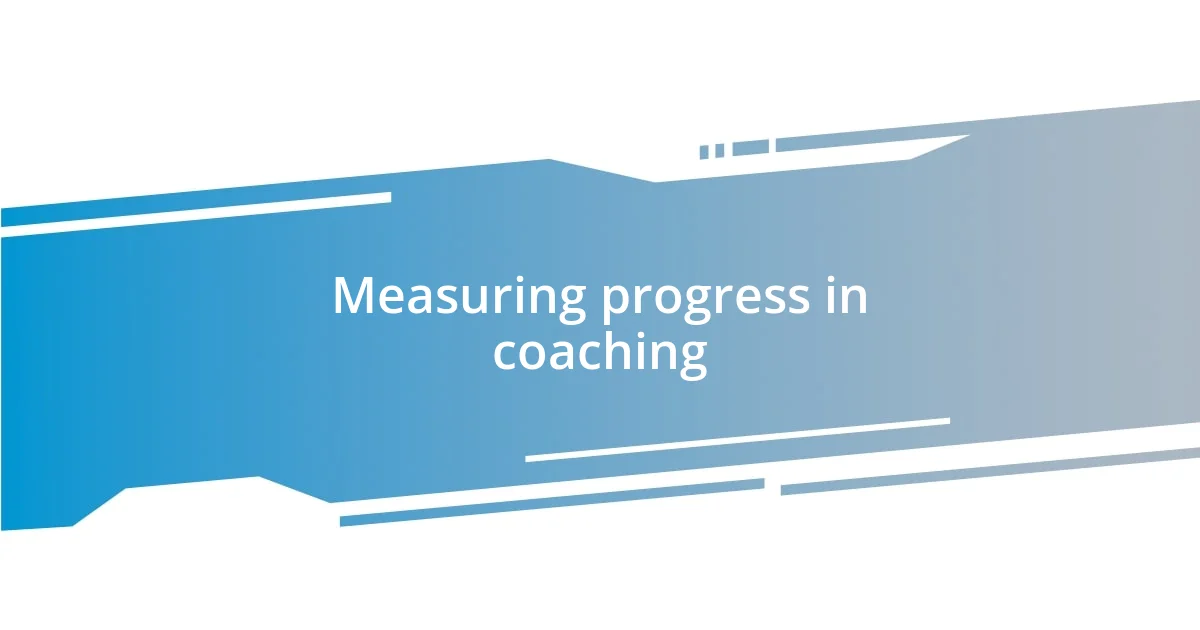
Measuring progress in coaching
Measuring progress in coaching often involves setting benchmarks and regularly reflecting on achievements. In my own experience, I used a simple metric: tracking my income growth month by month. I can vividly recall one particular month where I unexpectedly exceeded my target, and it felt like hitting a home run! This kind of tangible progress not only boosts morale but acts as a powerful motivator to keep pushing forward.
I also found it valuable to incorporate qualitative measures into my progress evaluation. For instance, I started keeping a journal to document my feelings and thoughts surrounding my income journey. One day, I stumbled upon an entry that detailed my fears and doubts at the beginning of coaching. It was enlightening to see how much I had evolved in my mindset—an emotional transformation that numbers alone can’t capture. Have you ever noticed how reflecting on your journey can reveal personal growth you may have overlooked?
Another aspect of measuring progress is seeking feedback from your coach. After each session, I’d ask for input on how effectively I was implementing their advice. I remember a particular instance where my coach highlighted an area I’d been struggling with, but my willingness to discuss it openly led to invaluable insights. This collaborative dynamic underscored the importance of continuous refinement in both my business strategy and self-awareness. How do you measure your growth? Sometimes, it’s the dialogues we have around our challenges that provide the clearest picture of our development.
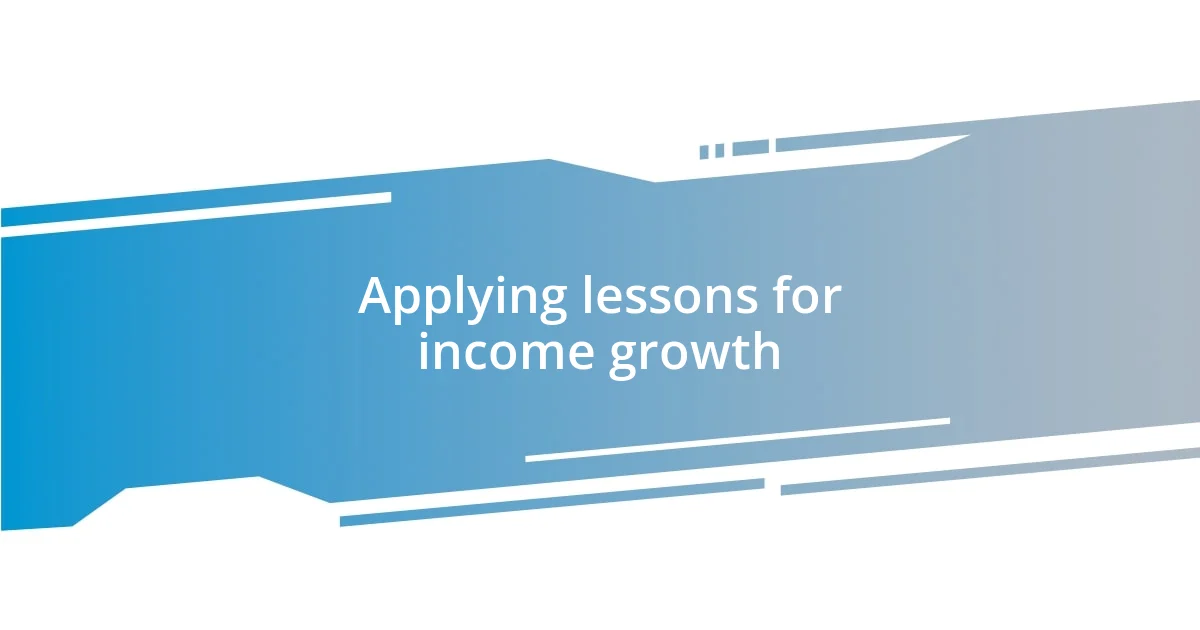
Applying lessons for income growth
One of the most impactful lessons I applied for income growth was the power of prioritizing high-impact tasks. Initially, I often found myself caught in a whirlwind of activities that seemed productive but yielded minimal returns. After some coaching sessions, I realized that focusing on strategic initiatives, like reaching out to potential clients or enhancing my service offerings, could significantly move the needle on my income. Have you ever stopped to consider how you’re allocating your time? I learned that sometimes, saying “no” to good opportunities can be the key to unlocking better ones.
Another important takeaway was the art of financial reinvestment. In my early coaching days, I hesitated to allocate funds for marketing or professional development. I often thought, “What if I don’t get that money back?” But over time, I adopted a mindset shift and began treating reinvestment as an investment in my future rather than an expense. I vividly remember making a leap to enroll in a specialized online course. That one decision not only expanded my skills but also led to a substantial increase in my service offerings and client base. How often do you invest in your growth? I can tell you that the returns have been worth every penny.
Networking was another valuable lesson that shaped my income trajectory. Early on, I viewed networking as a daunting task, but my coach encouraged me to approach it from a place of curiosity and connection. I started attending local events and engaging with others in my field without the pressure of expecting immediate results. One evening, while chatting with a fellow entrepreneur over coffee, I uncovered a collaboration opportunity that increased my visibility and led to significant client referrals. Have you had similar revelations in your own networking efforts? Embracing every conversation as a potential gold mine helped me feel more authentic and opened doors I never knew existed.
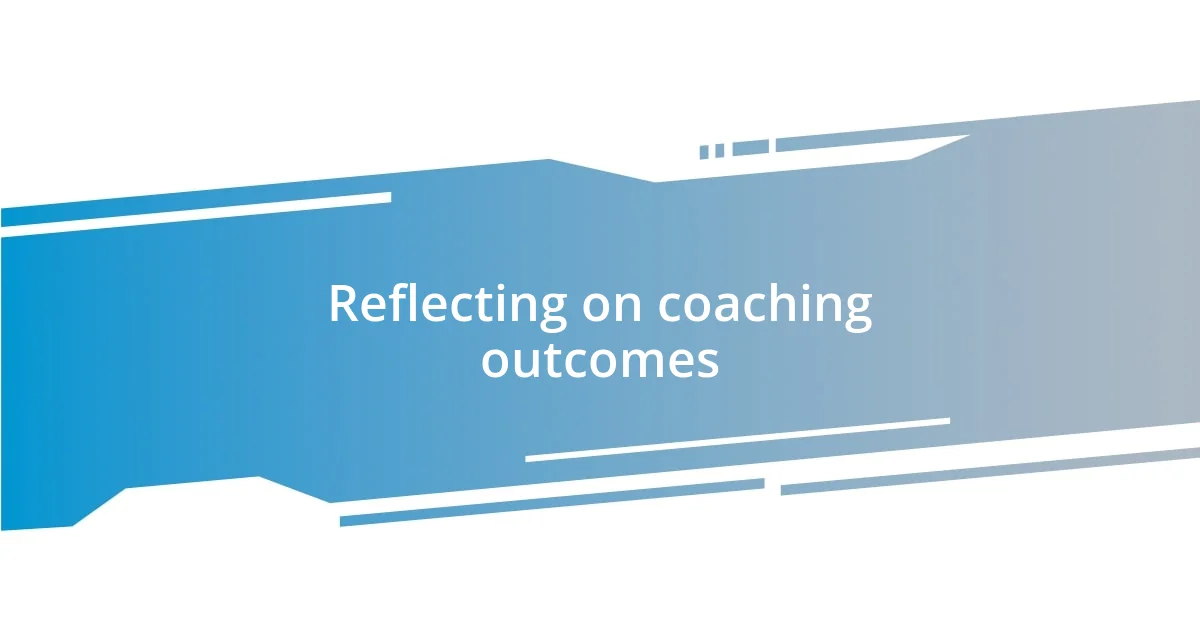
Reflecting on coaching outcomes
Reflecting on my coaching outcomes has often led me to unexpected revelations. I recall a moment when I compared my income this year to last—seeing that upward trend filled me with pride. It wasn’t just about the numbers; it was about recognizing the effort behind each dollar earned. Isn’t it fascinating how our perceptions of success can evolve over time?
As I delved deeper into self-reflection, I realized that my coaching journey went beyond tangible metrics. During one session, my coach encouraged me to reflect on my feelings of self-worth and how they intertwined with my financial achievements. I remember feeling a sense of vulnerability as I opened up about my initial hesitations and fears of not being good enough. That honest dialogue not only grounded me but also highlighted how crucial emotional resilience is in this journey. Have you ever paused to assess how your emotions can shape your professional path?
The beauty of reflection lies in the lessons learned through tribulations. There was a period when my income stagnated despite my efforts. Instead of feeling defeated, I revisited my coaching notes and realized that sometimes, growth isn’t linear. I discovered that my focus on maintaining the status quo was holding me back. This perspective shift taught me to embrace challenges as stepping stones rather than stumbling blocks. How often do we allow setbacks to define us instead of propelling us forward? In my case, this reflection resulted in actionable strategies that ultimately reignited my income growth.
















